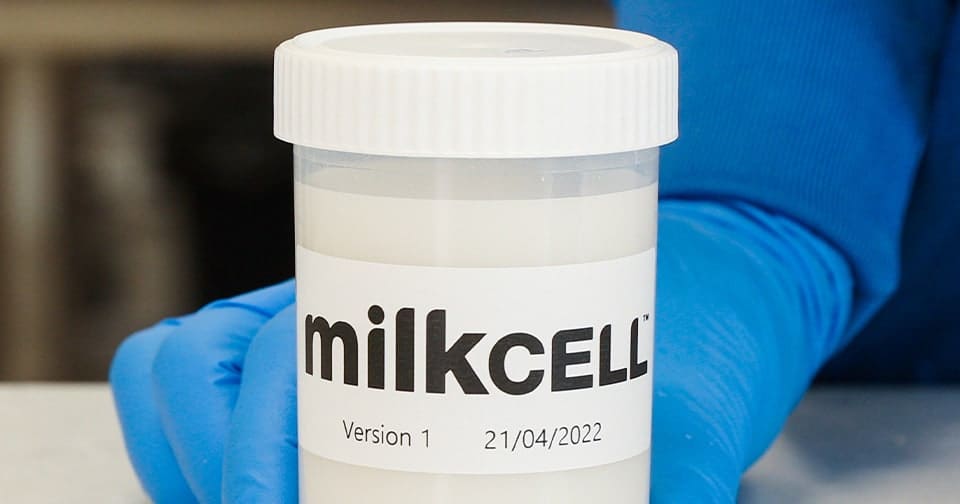
There is a growing demand for dairy substitutes in Australia. According to The Australian Bureau of Statistics, the amount of dairy and meat substitutes purchased from food retailers jumped another 14% in 2020-2021, following a 14% increase between 2019 to 2020.
Consumption of dairy milk substitutes rose 4g per day between 2018 and 2019 and 2020-21, mirroring a 4g per day fall in milk in the same two-year period. Almond milk had a particularly rapid rise, up 31% in the last two years. Soy milk increased by 16% over the same period.
Australians will soon have another alternative type of dairy. It has been called synthetic milk and lab-grown milk, but more accurately, precision fermentation is used to brew dairy proteins in a lab to create a product similar to cow’s milk. Eden Brew and All G Foods are at the forefront of this new technology in Australia.
Nature identical
Eden Brew co-founder and chief executive Jim Fader explains: “We call it brewed milk, because we use fermentation as the process to brew the proteins. I don’t think synthetic fairly describes the product. The fermentation process we use is close to beer brewing, and we don’t call beer synthetic.”
Fader adds, “Milk is 87% water, 3.5% fat, 3.5 % protein, 4% lactose, and a couple percent of other minerals, salts and vitamins. Pretty much every other ingredient in milk, other than the proteins, are easy to buy or emulate. You can even replicate the mouthfeel through plant-based fat. However, you can’t go to another source to recreate the proteins. It’s recreating the proteins using fermentation that unlocks the ability to make an animal-free milk.”
Just like the beer-making process, yeast is used. “We’re programming the yeast to express proteins into a ferment instead of alcohol,” says Fader. “We use synthetic cow DNA to do that. We then run what we call ‘precision fermentation,’ because you have to control temperature and pH very closely. The proteins expressed are nature identical. It’s close to what you find in the cow.”
Fader details the process. “Inside the cow’s tummy, you have two whey proteins and four casein proteins. The four casein proteins tangled together form a structure or casein micelle. Each casein protein will grab some calcium, some phosphorus, and another casein protein. That’s how nature makes the nutrition bioavailable; the micelle takes the nutrition in. If you can get these casein proteins to tangle together when you brew them, then you put all the nutrition in. We can make an animal-free milk just as rich in calcium, phosphorus and nutrition as dairy milk.”
All G Foods also uses precision fermentation for their brewed milk. Jan Pacas, founder and CEO of All G Foods says: “In three or four days, you turn 100,000 liters of water and sugar into identical milk.”
It is a game changer for a number of reasons, “First, you can make it completely independent of the weather. Whether it is New South Wales, or the Middle East, you can make it infinitely available,” he says.
“Second, it is healthy for the consumer. Plant-based milk alternatives don’t have any nutritional value. They typically have a very low percentage of protein and don’t have the creaminess,” Pacas explains. “Brewed milk is bio-identical to real dairy.
“Also, there are advantages from the health angle. For instance, 90% of people from Asia are lactose intolerant, we can design this to be without lactose, without antibiotics, without cholesterol, and give you the same taste and texture as dairy.”
Fewer resources
Because brewed milk is created in a controlled environment it requires less land and water to produce. “The dairy industry uses 1,000 liters of water to make one liter of milk. It takes 6,000 liters to make one liter of almond milk,” says Fader. “We use 5.7 liters of water to make one liter of milk.”
Australian dairy farmers are not all opposed to this milk innovation. A key investor in Eden Brew is the New South Wales dairy cooperative Norco, a farmer-owned dairy cooperative with 326 active members on 199 dairy farms in New South Wales and Queensland, with an annual production of 226 million litres.
Fader says: “Norco is keen, as our co-founder and a dairy company, to partner with this because 15% of the population is avoiding dairy at the moment, and that is growing. They see it as an opportunity for Eden Brew to be their non-dairy division.”
He expects dairy drinkers to also enjoy the product, while addressing the environmental and animal welfare questions. He points out the most important impact of brewed milk: “The big opportunity here is around what we will see over the next 30 years. A huge increase in protein consumption is forecast – predominantly through diet change and predominantly in Asia. The World Resources Institute said anywhere from 50-100% increase in demand for protein over the next 30 years. That’s an increase in demand we’ve never faced before on the planet. You can’t double the dairy, beef or lamb industry. And you certainly can’t double it in 30 years.
“We urgently need to find less resource-intensive ways to produce our food,” he says.
It is no longer a matter of stealing sales from dairy or plant-based milk. “We’re part owned by the dairy industry,” Fader says. “It shows how the dairy industry is innovating to meet future demand in a sustainable way.”
Unsurprisingly, some Australian dairy farmers don’t see brewed milk as the future. NSW Farmers Dairy committee chair Colin Thompson believes there is a market for plant-based products, but he doesn’t believe synthetic milk would ever replace the real thing. “Nature got it right the first time with milk, the nutritional benefits cannot be replicated,” he says. “Milk comes from an animal, not a laboratory. I think milk will continue to have a future because it’s natural and good for you.”
Both Eden Brew and All G Foods aim to have their brewed milk available in 2024.
Maida Pineda
